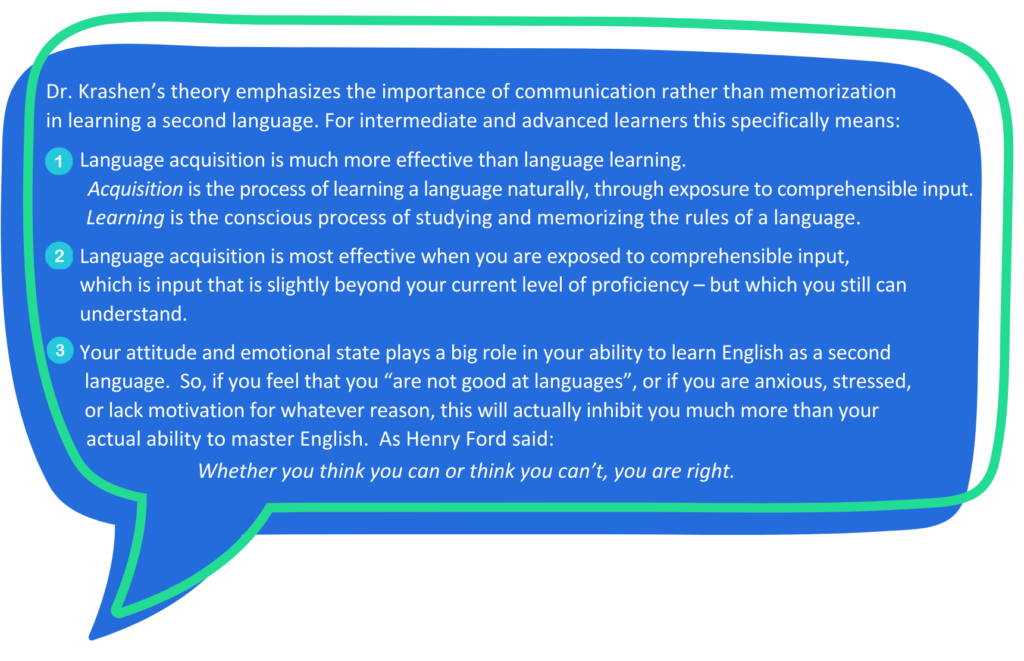Have you ever heard of Stephen Krashen? If not, let me introduce you to him and explain why he’s important for anyone learning a new language, especially English.
Dr. Krashen is an American Emeritus Professor of Education and a renowned expert in linguistics. He has written over 486 publications, including more than 100 books on how people learn languages. His theories emphasize the importance of communication rather than memorization when it comes to learning a second language.
One of the main points of Dr. Krashen’s theory is that language acquisition is much more effective than language learning. Language acquisition happens naturally, through exposure to comprehensible input—language that is just a bit above your current level but still understandable. On the other hand, language learning is the conscious process of studying and memorizing the rules of a language. Think of language acquisition like a scenic road trip, where you enjoy and absorb the beauty around you, while language learning is like a classroom lecture about that road trip without actually experiencing it.
Imagine watching a captivating movie with subtitles or reading an engaging book slightly above your current proficiency level. This is what comprehensible input is all about. It’s content that challenges you just enough to stretch your understanding but is still accessible. This could be a podcast with clear enunciation, a well-crafted YouTube video with subtitles, or a story where the context helps you understand new words. In contrast, language learning through structured lessons often misses the true essence of the language—its rhythm, nuances, and authenticity.

The power of comprehensible input lies in its ability to transform your language learning journey. Picture it as an adventure where you navigate through words, sentences, and expressions just beyond your current level. This could involve reading an article that introduces new vocabulary in context, listening to a podcast where native speakers talk at a moderate pace, or using bilingual materials that provide translations when needed. The key is to find the right balance between challenge and understanding, making language feel like a captivating puzzle rather than an insurmountable barrier.
Another crucial aspect of Dr. Krashen’s theory is the role of your attitude and emotions in learning a language. Your mindset and emotional state are like the wind in your sails; positive emotions propel you forward, while negative ones can create unnecessary turbulence. As Henry Ford said, “Whether you think you can or think you can’t, you are right.” If you believe in your ability to learn English and approach it with enthusiasm and curiosity, you will find the journey smoother. On the other hand, self-doubt, anxiety, or a lack of motivation can hinder your progress. Recognizing this connection empowers you to tackle challenges with resilience and fosters a positive environment for language acquisition.
So, in summary, the most effective way to learn English, regardless of your age, is to expose yourself to meaningful and engaging language input. This approach allows you to naturally acquire the language without relying too much on formal grammar and tedious vocabulary memorization. If you’re eager to apply this learning model and enhance your English skills, sign up here to receive exclusive content over eight days. Each day, you’ll get an article, a video to read along with, and exercises to practice new vocabulary. Try it out and get ready to enjoy your language learning journey!
_______________________________________________
Want to enhance your English Communication Skills with PRACTICAL TIPS AND TOOLS?
Get practical strategies to improve your English communication and presentation skills—plus, access the FREE LEARN Blueprint – Your Guide to Mastering English, your step-by-step guide to speaking English with confidence.

